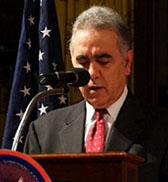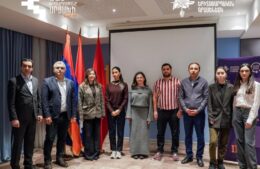Why Turks Were Able to Exterminate Armenians, But Not Jews
- (0)
Why Turks Were Able to Exterminate Armenians, But Not Jews –
BY HARUT SASSOUNIAN
(Part II)
 This is the second and final part of a column I wrote last month, analyzing why the Young Turks were able to exterminate the Armenians, but could not carry out their simultaneous plan to eliminate the Jewish settlers of Palestine.
This is the second and final part of a column I wrote last month, analyzing why the Young Turks were able to exterminate the Armenians, but could not carry out their simultaneous plan to eliminate the Jewish settlers of Palestine.
On May 9, 1917, Reuters disseminated the following news report by settler Aaron Aaronsohn: “an order was given to deport all Jews from Tel Aviv, including citizens of the Central Powers [Germany and Austria-Hungary], within 48 hours. A week before, 300 Jews were expelled from Jerusalem. Jamal Pasha declared that their fate would be that of the Armenians. The 8,000 deportees from Tel Aviv were not allowed to take any provisions with them, and after the expulsion their houses were looted by Bedouin mobs.”
Shortly thereafter, Oskar Cohen, a Jewish socialist member of the German Parliament, asked the Chancellor to press the Turkish government “to vigorously prevent the recurrence in Palestine of atrocities” against Jews similar to the ones committed against the Armenians.
On June 8, Aaronsohn wrote in his diary: “The cry we raised was effective. The Turks and the Germans were quick to realize that one cannot get away with slaughtering the Jews like the Armenians. German financing of the war might have suffered because of the Jews. Therefore they ceased the new deportations.”
Palestine, the official journal of the British Zionist movement, described the significant difference between the lobbying capabilities of Jews and Armenians: “The German government knows that the Jews do not compare to the Armenians in terms of their world power, and that the weight of the Jews in Germany is therefore different from that of the Armenians.”
Mordecai Ben-Hillel Hacohen, a prominent chronicler of Jewish history in Palestine, wrote in his diary of March 30, 1917: “the Turkish government has been stained in the eyes of the whole country because of its crime against the Armenians, and perhaps the government will reconsider its thoughts of doing thus to the Jews as well….”
Moshe Smilansky, a leader of the Jewish agricultural settlements in Palestine, after relating reports of the terrible massacres of Armenians, concluded: “The testimony of the eye witnesses aroused fear and panic in the Jewish audience. Who knows what would have been our fate were it not for Morgenthau, the American representative in Constantinople, and the fear of the world press which is ‘controlled’ by the Jews.”
Yair Auron reported in his book that Meir Dizengoff, a leader of the Jewish refugees in Palestine throughout World War I, “worked in close cooperation with the Zionist delegation in Constantinople, which was pro-German and pro-Turkish. According to Dizengoff, there were also excellent relations with the German consul in Palestine…. The consul served as a conduit for transferring funds to the Yishuv [Jewish community], on orders from the German Ambassador in Constantinople.” Dizengoff also stated that the Germans were the ones who assisted and saved the Yishuv. “The fact that Jamal Pasha became more sympathetic to the Jews was due to Germany.” Dizengoff recalled Jamal and Enver Pashas’ threats to the Jews: “Zionists beware! If you oppose us, we will do to you what we have done to the Armenians.”
In October 1917, when the Turkish authorities uncovered the Jewish Nili spy ring, a new threat loomed over the Jewish settlers in Palestine, giving yet another excuse for the Turks to oppress them. They feared that such anti-Turkish efforts would result in harsh counter-measures as practiced against Armenians. The Turkish Governor of Haifa met with Jewish leaders of the village of Zichron Yaakov on October 4, 1917, and threatened that unless they cooperated with his demands, he would do to them what he did to Armenians. He told them that he “barehandedly killed several Armenians, and his soldiers killed thousands of them.” Chaim Margalit-Kalvarisky, the representative of the Jewish Colonization Association in Galilee, wrote the following note in his diary: “I received word from a fairly dependable source that the [Turkish] high command was very angry at the Jewish settlement, and they were consulting about the possibility of a general deportation of all the Jews of Palestine to the furthest provinces of the Empire [Eastern Anatolia].” Kalvarisky recorded Jamal Pasha’s ominous words after a heated exchange with him: “Heaven help the people whose sons are those cursed spies. We taught the Armenian people a lesson about such deeds, and we will not hesitate to take the same steps in this case.”
Having witnessed the brutality of the Turks against Armenians who were accused of insubordination and rebellion, the Jewish settlers decided to be completely submissive and not challenge the Turkish authorities. Prof. Auron observed that “there was not a single attack by a Jewish settler on a Turkish soldier.” What ultimately saved the Jews was the occupation of Palestine by the British forces, precluding further brutalities and massacres by the Turkish authorities.
At the end, 1.5 million Armenians were wiped out, whereas the Jewish settlers of Palestine suffered relatively minor losses. During the war years, the Jewish population of Palestine was reduced from 86,000 to 55,000. Despite the fact that Armenians had also their advocates in Europe and the United States, the Jewish settlers enjoyed the double protection of powerful countries on both sides of the war: the Western countries, including the United States, and Germany, Turkey’s military ally. Vahakn Dadrian, in his book, “The History of the Armenian Genocide,” relates that Hans Wangenheim, the German Ambassador to Turkey, told US Ambassador Henry Morgenthau: “I will help the Zionists… but I shall do nothing for the Armenians.”
While Germany saved the Jewish settlers of Palestine, it assisted the Young Turk regime to exterminate the Armenians.



















